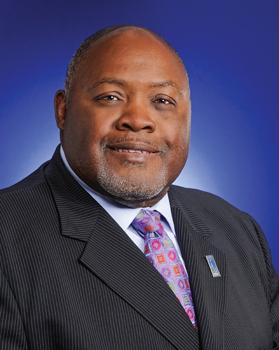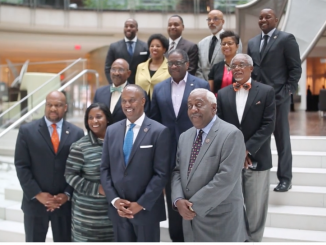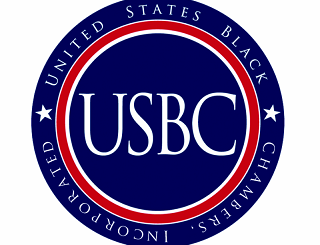
Rep. Gregory Porter tells voters: ‘You can’t be the invisible.’
By Hazel Trice Edney
(TriceEdneyWire.com) – The president of America’s largest organization of Black legislators has called for unity behind economic development initiatives prioritized by Black Wealth 2020, a movement launched two years ago to forge progress for Black-owned businesses, banks and homeowners.
“Economic development is the cornerstone for everything. It’s kind of interesting to talk to you all because you’re living it every day. You know what it takes,” said Indiana Rep. Gregory W. Porter, president of the National Black Caucus of State Legislators (NBCSL).
He was speaking to Black Wealth 2020 founders, executives and associates at its second anniversary luncheon. “What it takes is for a community to get along. Also, we don’t spend with our people like we should and we know that. The bottom line is this: We know the whereases. We know what the problems are. Therefore, what are we going to do? Jesse [Jackson] said years ago ‘Can’t nobody save us but us.’… That’s what we’re doing right now, saving us.”
Backing from the NBCSL adds significant momentum to Black Wealth 2020, founded two years ago by Ron Busby, president/CEO of the U.S. Black Chambers Inc.; Michael Grant, then president of the National Bankers Association; and Jim Winston, president of the National Organization of Black Owned Broadcasters. At least a dozen other major Black organizations have either joined or expressed support for its economic initiatives.

PHOTO: Rodney Minor
“We own too little land. We have too lower median income than other Americans. We have much lower family wealth than our White brothers and sisters and we’ve got to make that change,” Porter said to shouts of “Amen” and applause from the audience.
A strategy to unify with other organizations will be the key to success, said Porter, a Democrat serving his 13th term in the Indiana General Assembly.
“We’re working with the NAACP, Urban League, other groups and National Organizations because if we do that we’ll be strong together. We can’t continue to be silos. So, I know as we go forth, we will do it as a community. And so, remember, you have 600 legislators, we represent 60 million people. We’re in 45 states, plus U. S. Virgin Islands and the District of Columbia. We have the means. It’s up to all of us to come together and have the will.”
Speaking to the luncheon gathering at HomeFree-USA, Porter listed a number of economic policies currently being pushed by NBCSL, which has a membership that blankets the nation; plus the U.S. Virgin Islands and Washington, DC. “We represent about 60 million people in rural communities and we come together two or three times a year in an annual conference.”
Pointing to long-held discussions about Black wealth, Porter, ranking minority member on Indiana’s Ways and Means Committee, stressed that the most important need now is less talk and more strategic action. “The bottom line is that we can talk all we want to, but we’ve got to have our independence in regards to economics,” he said.
As an example of action, he said he and like-minded legislators have had to hold up certain projects in order to assure Black participation.
“We’re the super minority, so a lot of us are fighting to stay relevant in this whole process,” he said. “They always go to the big company, but we’ve got to know how we’re going to build our capacity by choosing minority companies…We’ve worked very hard in dealing with minority access for sustainable financial institutions through our resolutions. As Black Caucuses across the country, we’re increasing our fair contracting opportunities and practices for economic parity. These are resolutions that we’ve passed.”
Among key economic issues being dealt with in legislatures daily are homeowner protection, anti-predatory lending, home affordability resolutions, anti-discrimination and gentrification issues. Preparation for the 2020 Census and making sure African-Americans are fully counted will also be key, he said. NCBSL’s next legislative conference will be held Nov. 28 at which time they will “look at Black wealth.”
Echoing the importance of unity in order to accomplish economic goals, HomeFree-USA President/CEO Marcia Griffin appealed to those in the room to “be our ambassadors, our messengers, etc. because we need to reach thousands with a sense of understanding and get people to wrap their arms around our goals. … We’re from all sorts of different segments of the Black community, but we’ve come together to work together to empower ourselves and empower our community and empower our country.”
Grant, now based in Nashville, where he is regional president of United Security Financial, a mortgage banking company, agreed with the appeal for harmony. “We’re not trying to upstage anybody,” he said at the Feb. 15 event. “We’re not trying to compete with anybody. What we’re trying to do is pull our strength together so that when we speak with one voice, they’re looking at all of these organizations coming together and it’s hard to say no to that kind of power.”
Porter also underscored the importance of constituents holding lawmakers – including Black legislators – accountable and not taking for granted that they will automatically push for economic inclusion. He suggested that constituents:
- Have their own kitchen cabinet and invite legislators to neighborhood and community meetings.
- Come to state houses, visit the representatives’ offices.
- Attend and speak at public hearings.
“You can’t be the invisible,” he said. “We’ve got to stay woke about economic development and the process that we have. We did build this country. We need to manage this country.”
Expressing the importance of this year being the 50th anniversary of the beginning of Dr. King’s Poor People’s Movement, Porter said, “It does mean a lot to us…You’ve got to know where you came from to know where you’re going.”



